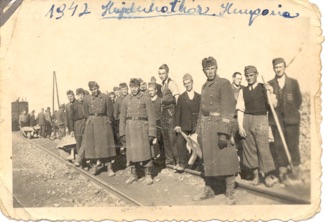
Music from the Carpathian Bow
Text
After Dad was taken away, Hersch leib took over the shoemaking business and so became the sole provider for Mom and my brothers. At that time Mordechai lived in Budapest working as a barber . In October or November, 1941, I received a summons directing me to report to a labor camp in a town called Szolnok. I took leave of Grandfather on a Saturday in the synagogue. He broke down and cried, which moved me to tears too, as I wondered if I would ever see him again. Next day, as I was ready to board the vehicle to the train, I said good bye to Mother. Although words failed both of us, her eyes spoke volumes. I had never before seen such anguish and despair as I saw in her eyes. I will carry this image into my grave. It was as though she had a premonition that it was the last time we would see each other .
The train ride (in a cattle car) took about twenty-four hours. Upon arrival in Szolnok, there were many of us, we were met by a soldier and proceeded on the run, carrying our heavy trunks, for four miles through unpaved streets, up to our knees in dust, accompanied by the soldiers shouts, to the army base, while all through the route people, roused by the commotion, opened the windows and were laughing, thoroughly enjoying themselves. They found this very amusing. Our initiation started in earnest when we arrived at the base. We were lined up and a sergeant, a little man with a big voice, delivered the welcoming address. His words were, I quote, "Israel, about face, I don't want to look in your ugly mugs. You sucked Hungarian blood, your seduced Hungarian girls, and now you will pay." The speech over, we were led into a building to undergo what turned out to be a perfunctory medical examination. As we reached the door, a soldier standing there ordered each of us to bend down and "kiss the Hungarian threshold." As we did so, he amused himself by trampling on our hands with his boots. The next day, we were shipped to a permanent station in another town where we started our tenure, during which time we served in different locations in Hungary and in Transylvania which was then under Hungarian rule.
Boris, 2nd from left in labor camp in Hajdúhadház, Hungary.

Our uniforms consisted of an army cap without the insignia and a yellow arm band on the left sleeve. The clothing was civilian which we had to provide for ourselves. We slept on boards covered with a thin layer of straw. Discipline was strictly enforced. To and from work we had to march in step and sing, whether we felt like it or not. Upon return from a hard day's work, we were subjected to army type drilling. Any infraction of the rules brought severe punishment which consisted of beatings. One particularly barbaric form of punishment consisted of tying the hands behind the back with a long rope which was thrown over a tree branch and pulled until the victim's feet left the ground. Every time the victim feinted which he invariably did after a few minutes, he was eased down, revived with a pail of cold water in his face and strung up again. That was repeated until the prescribed time elapsed. The victim was granted one important privilege. He was allowed to shout, cry and or curse all he wanted. I witnessed one such scene during my tenure in labor camp.
One time in the early part of 1943 after finishing the chow, I stepped into the end of the line for seconds. I knew it was risky but hunger overrode my better judgment, when suddenly I received a stunning blow to the head by one of the cooks. He was a big, husky specimen. He hit me with such force that I spun around on my own axis two times. This, while causing pain, turned out to be a blessing. That night I had an excruciating earache accompanied by a discharge of pus from my ear. The pain kept me awake all night. In the morning I reported to sick bay and was promptly dispatched to a hospital in the city of Debrecen. There I received good treatment and a six week's welcome rest. There I had plenty of good food and at the end of my stay felt rejuvenated and returned to my unit, not with a great deal of enthusiasm.

Memoirs
Boris Segelstein